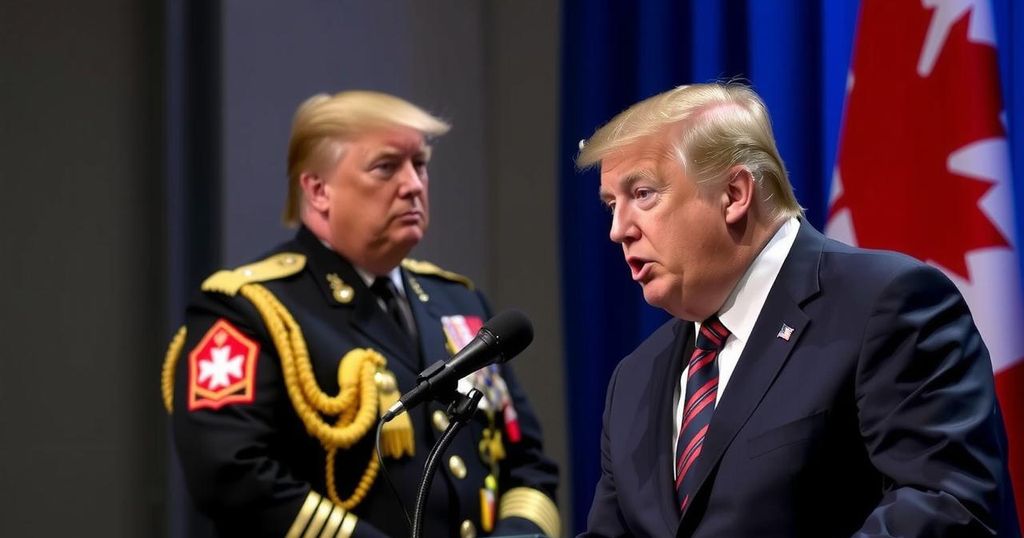Ontario Premier Critiques Trump’s Proposed Tariffs on Canadian Imports
President-elect Donald Trump’s plan to impose a 25% tariff on Canadian imports has sparked widespread concern in Canada, with Ontario Premier Doug Ford labeling it “devastating” for jobs. While the Canadian government has engaged in dialogue with Trump, emphasizing the importance of trade relations, there are fears about the potential economic fallout from these tariffs as the US strengthens its border security measures.
The imminent threat posed by US President-elect Donald Trump to levy a 25% tariff on imports from Canada and two other major trading partners has ignited significant concern in Canada. Trump intends to implement these tariffs shortly after his inauguration on January 20, 2025, framing this move as part of a broader strategy to combat illegal immigration and drug trafficking across the US border. Doug Ford, the Premier of Ontario, characterized the proposed tariffs as “devastating” for workers and jobs in both Canada and the United States.
Despite the gravity of the situation, the Canadian government has responded with measured caution. Prime Minister Justin Trudeau engaged in discussions with Trump, as well as provincial leaders, emphasizing Canada’s prioritization of the US-Canada trade relationship, which accounted for approximately $437 billion in US imports in 2022. Canadian ministers highlighted the significance of cooperation along their shared border, with Deputy Prime Minister Chrystia Freeland and Public Safety Minister Dominic LeBlanc pointing out that 60% of US crude oil imports came from Canada last year.
Ford urged Trudeau to convene an urgent meeting with provincial leaders, echoing concerns shared by other provincial leaders. However, some individuals called for a calm approach, suggesting that Trump’s tariff threats may serve as a negotiating tactic rather than an immediate policy change—a view corroborated by Scott Bessent, Trump’s Treasury secretary nominee, who stated, “it’s escalate to de-escalate.”
Trump’s appointment of Tom Homan as a new border enforcement administrator has also spotlighted the northern border as a significant vulnerability. Homan has advanced arguments suggesting that Canada could be exploited as a passage for individuals from countries identified as sponsors of terrorism, despite the fact that illegal crossings from Canada into the US are dwarfed in comparison to those from Mexico.
Overall, while Canada responds to the potential tariffs with discussions aimed at fortifying their mutual trade agreement, the implications of such tariffs are yet to unfold, raising concerns about the economic impacts on both nations.
The discussion surrounding trade tariffs imposed by the United States has been a contentious issue, particularly in relation to Canada, one of its largest trading partners. US President-elect Donald Trump’s proposal for a 25% tariff on imports from Canada stems from a stated intent to diminish illegal activities, such as human trafficking and drug smuggling, at the shared border. Canada has historically benefited significantly from its trade relationships, with billions of dollars in exports and imports linking the countries annually. Any disruption caused by tariff implementations has the potential to impact jobs, economic growth, and the stability of cross-border exchanges.
In conclusion, the proposed tariffs by President-elect Trump reflect significant potential upheaval in US-Canada relations. Premier Doug Ford’s characterization of the tariffs as “devastating” resonates with concerns over job losses and economic repercussions within both nations. While the Canadian government seeks to maintain calm and reiterate its commitment to the existing trade partnership, the looming threat requires careful navigation to avert adverse outcomes for both economies.
Original Source: www.bbc.com




Post Comment